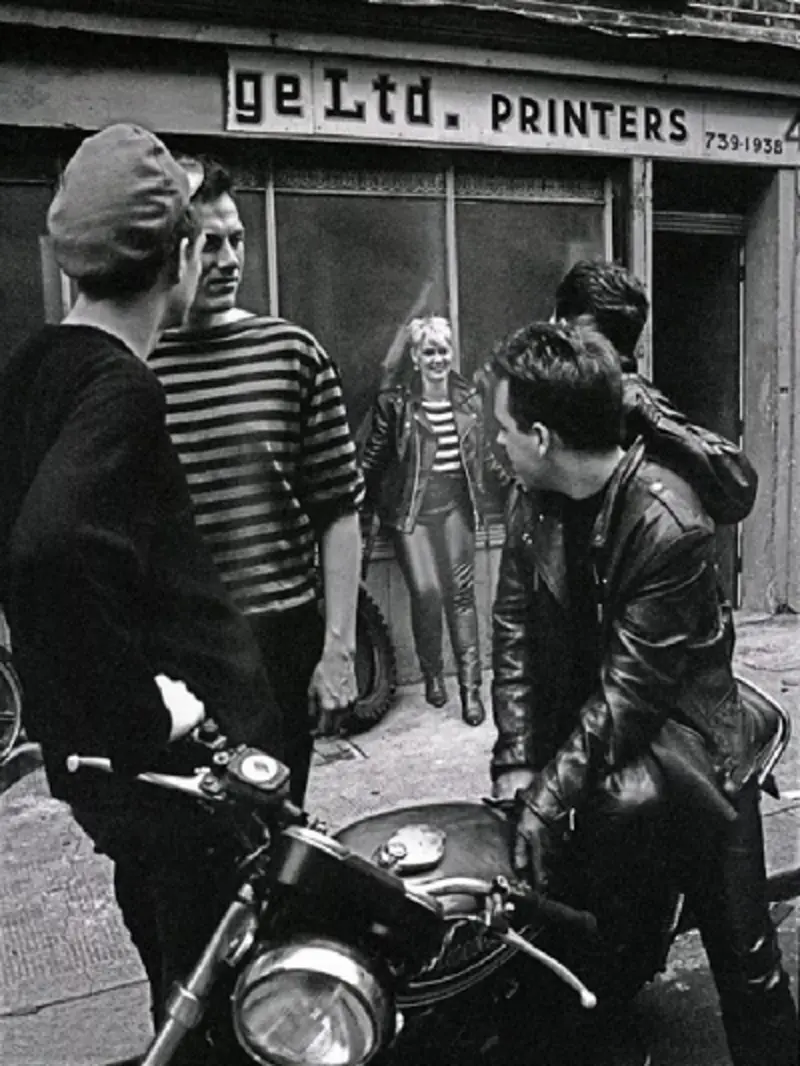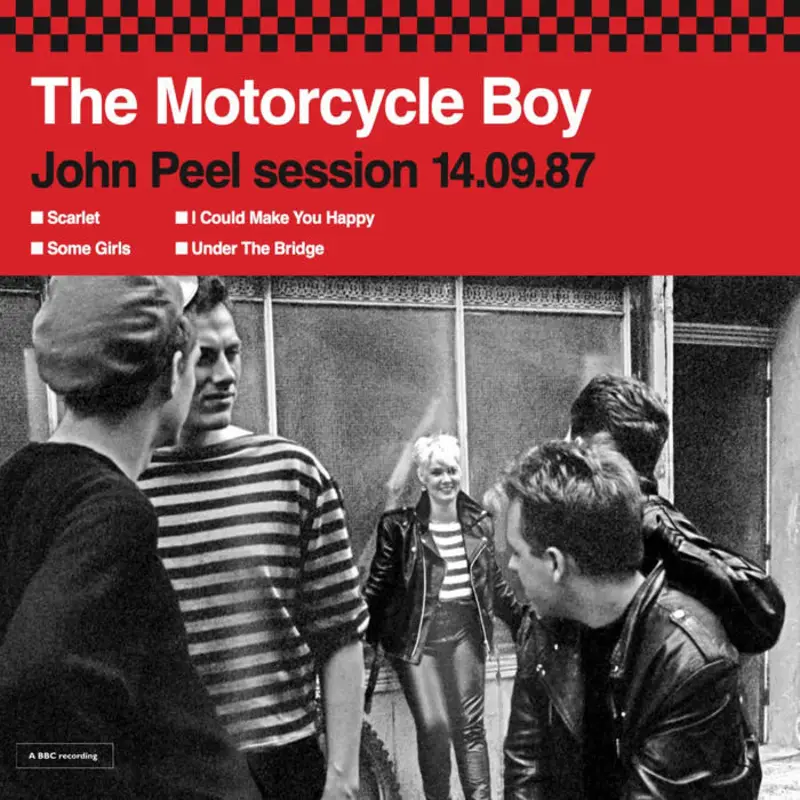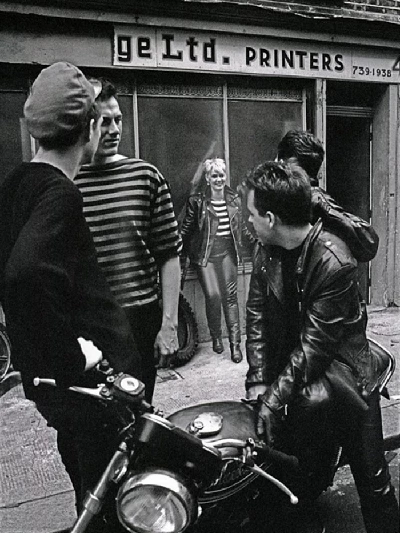Motorcycle Boy - Interview
by John Clarkson
published: 7 / 9 / 2025

intro
Michael Kerr, the guitarist with 80'sEdinburgh indie band The Motorcycle Boy, speaks to John Clarkson, about the group and the recent release on Precious Recordings off London of their only radio session.
With their trademark lush guitars, Alex Taylor’s crystal vocals and catchy choruses, the Edinburgh-based The Motorcycle Boy for a few brief months in 1987 seemed destined for major success. Their debut single ‘Big Rock Mountain Candy’ received unusually for an indie act daytime national radio airplay, and it reached no. 2 in the indie charts. Shortly after that, they appeared in somewhat bizarre circumstances on the front cover of ‘NME’, But from there it was all downhill for the band which former Shop Assistants singer Taylor had formed the previous year with her boyfriend Eddie Connolly (bass). Michael Kerr (guitar) , David Scott (guitar) and Paul McDermott (drums). Connolly, Kerr and McDermott had all been in Meat Whiplash, which had released in 1985 a single ‘Don’t Slip Up’ on Creation Records. A second single, the Flood-produced ‘Sweet Dreams Pretty Baby’, was recorded, but neither the band nor the label liked it and it was never released. The Motorcycle Boy also recorded an album, ‘Scarlet’, but that was also shelved in what has been described as “a perfect storm of band in fighting, sackings, naïve management and record company reticence.” In 2019 Michael Kerr discovered and was able to buy back the rights to ‘Scarlet’, and it was released thirty-one years after it had been recorded on his own label, Forgotten Astronaut Records. It won critical acclaim and went through two pressings. Unfortunately it arrived too late for Alex Taylor, who had dropped out of public view in 1990 after both The Motorcycle Boy, who had recorded a few final unsuccessful singles, and her romance with Eddie Connolly had ended. It transpired in 2020 that she had died fifteen years before in 2005. Both Connolly and Anthony Cooper, who had replaced Paul McDemott on drums for ‘Scarlet’, have also died since its release. Interest in this most unhappy of bands has continued in recent times. This year has seen the publication of ‘You and Me Against the World’, a book by Saskia Holling about Edinburgh’s indie scene, which puts special focus on Alex Taylor’a musical career, and also has seen through Precious Recordings of London the release on 10” vinyl of their sole radio session for John Peel in 1987. We spoke to Michael Kerr about the Motorcycle Boy’s history and the Peel Session. PB: The Motorcycle Boy had a ‘NME’ cover, did the Peel Session and had a no,2 indie hit with ‘Big Rock Mountain Candy’, all within the space of a few short months in the late summer and autumn of 1987. Do you think that you peaked too early and as a still young band didn’t have the material to capitalise on it and to follow it up? MICHAEL KERR: I don’t think we peaked too early but we certainly didn’t have enough material to follow up 'Big Rock Candy Mountain'. We did record a second single, produced by Flood, but we weren’t happy with it and it was shelved although ‘Sweet Dreams Pretty Baby’ did end up as a bonus track on the CD release of ‘Scarlet’. The ‘NME’ front cover came at a time when there was turmoil at the publication. The original cover was pulled by the publishers and a number of staff resigned at what they saw as an act of censorship. In a panic they decided to put us on the cover even though the article was half a page. To many people that would have looked suspicious but they wouldn’t have known the background. The band were never particularly well managed and could have done with a bit of guidance at times. Our managers were reactive rather than proactive. PB: In a somewhat self-effacing interview in August 1989 on the Scottish music programme ‘Transmission’, Alex Taylor described as “almost legendary, our inability to play live.” She also said about a tour that The Motorcycle Boy did with The Jesus and Mary Chain that “we were totally unprepared for anything of that size.” Is that how you remember things as well? MK: We had a lot of problems with the original drummer which set us off on the wrong foot. It took a long time to overcome that problem but we could and should have dealt with it a lot better than we did. Personally I don’t think a support slot on the Mary Chain tour should have been something that was beyond us. What we did need was more guidance from our management company. A big part of any problems the band faced could have been resolved by better management. PB: Bofh Alex Taylor and Eddie Connolly have now passed, You describe them on the sleevenotes of the ‘Peel Session’ as “the Posh and Becks of the Edinburgh music scene.” Why did you say that? MK: That’s just a throwaway line that I use for couples that are as far away from the Beckhams as possible. Alex and Eddie’s relationship was fraught at times. Perhaps Taylor and Burton would have been a better comparison. PB: You recorded a good John Peel session, but Dale Griffin and his studio staff were, as you say in the sleeve notes, disinterested and Peel himself not much better. Why do you think that you met with such apathy from them? MK: Many of the BBC staff had participated in big recordings back in the 70’s. During the Meat Whiplash ‘Peel Session’ the engineer told us, on more than one occasion that he had worked with Queen. We weren’t impressed the first time he told us never mind the third and fourth. They may have been to go to guys back then but their star had waned and they were now working with people that they wouldn’t have given the time of day to back in the 70’s. According to Alex, the Shop Assistants session had not been a particularly encouraging experience either. Morrissey has mentioned how much he disliked having to do radio sessions for the BBC. I’m sure ther are a number of artists with similar tales to tell. PB: ‘I Could Be Happy’ from the Peel Session is, like the other tracks from the session a strong number but didn’t make the album. Can you remember why you left it off ‘Scarlet’? MK: That was probably down to me. It was never a song that I necessarily liked, it was too much of a typical late 80’s “indie” song for my liking. I felt, perhaps incorrectly, that we had moved beyond that. I don’t think the rest of the band shared my disdain but they obviously didn’t like it enough to fight its corner. I still have the Scarlet version on a hard drive that I will eventually get around to uploading somewhere. PB: Eddie Connolly was the owner of a label, Narodink Records. You yed occasional guitar in Jesse Garon & The Desparadoes, and Alex had been in The Shop Assistants. What are your memories of the Edinburgh indie scene of the late ‘80s? MK: There was a great amount of support between the bands involved. Sharing equipment, band members and rehearsal spaces was common. I loved being part of that “scene” and Jesse Garon & The Desperadoes gave me my first opportunity of playing the guitar in a live setting. Many of the people involved were a big part of my life, a part of my life that was hugely significant. , PB: How big an act was The Motorcycle Boy pn it and how well did it fit in? MK: Looking back I think we were probably a little bit apart from the other bands. There was a certain amount of animosity towards us due to the fact that Alex had left the Shop Assistants to form the Motorcycle Boy. The Shop Assistants were the true darlings, and rightly so, of the Edinburgh scene so to have somehow caused a disturbance in the force was never going to be viewed with any great admiration. PB: How did The Motorcycle Boy become involved with Precious Recordings of London? MK: As far as I’m aware, after Nick Godrey released the Desperadoes session it was suggested that both the Meat Whiplash and Motorcycle Boy sessions would be available. Nick contacted me regarding both bands but the Meat Whiplash session was about to be released on a compilation, ‘Collected/Contextualised’, on Silver Girl Records. With that in mind it was decided to go ahead with The Motorcycle Boy. PB: Have you been surprised at how much continued interest The Motorcycle Boy has attracted in recent years despite releasing just three singles in its original lifetime, two of which went nowhere, or as the main overseer of getting ‘Scarlet’ into the shops 31 years late did you think the potential was always there? MK: Interest seems to come in cycles, every few years interest from somewhere seems to rear its head, sometimes from the strangest of places. The release of ‘Scarlet’ was nothing more than something both David Scott and myself needed to happen. I don’t think I’ve many, if any, regrets in life but it would have been a shame if it had never seen the light of day. How many it would sell or how much interest it would garner was neither here nor there but it was a pleasant surprise that it did so well. We had planned on doing a third pressing, after the first two sold out, but the pandemic put an end to that plan. PB: What do you make of ‘Scarlet’ and your Peel Session looking back on them now? MK: I still love ‘Scarlet’ and I’d be quite happy to sit and listen to it. I think there is some really great songs on it. I’ll be honest, I’d never listened to the Peel Session from the day it was recorded until the day I received the vinyl copies from Nick. It was a fraught day that I didn’t think I wanted to revisit. Obviously that changed when Nick contacted us and I think you can hear the difficulties we faced that day, but it’s a very good representation of where we were as a band at that time. PB:: Thank you.
Band Links:-
https://www.themotorcycleboy.co.uk/https://www.facebook.com/The-Motorcycle-Bo
https://en.wikipedia.org/wiki/The_Motorcycle_Boy
Picture Gallery:-

interviews |
|
Interview (2019) |

|
| Guitarist Michael Kerr talks to John Clarkson about his late 80's band the Motorcycle Boy's brief, fiery career and the release of their only album 'Scarlet' thirty years after it was recorded. |
most viewed articles
current edition
Waterboys - Roundhouse, London, 1/6/2025Last of the Lovely Days - Interview
Cary Baker - Down on the Corner: Adventures in Busking and Street Music
Lemonheads - O2 Ritz, Manchester, 16/8/2025
Brian Wilson - 1942-2025
Motorcycle Boy - Interview
Tossing Seed - Interview
Morrissey - Photoscapes
Belouis Some - Video Vault
Robert Forster - Interview
previous editions
John Clarkson - A Life in MusicAin't That Always The Way - Alan Horne After The Sound of Young Scotland 2
Bob Mould - Brooklyn Bowl, O2 Academy, London, 11/2/2016
Stereogram Revue - Voodoo Rooms, Edinburgh, 2/12.2015
Miscellaneous - Minehead, Somerset, 8/5/2009...10/5/2009
Bill Hicks - Profile
Flip Side - Raging Pages
Dave Greenfield - 1949-2020
That Petrol Emotion - That Petrol Emotion, Town and Country Club, London, 1988
School - Interview
most viewed reviews
current edition
Good Charlotte - Motel du CapBig Flame - Peel Sessions 84-86
Bruce Dickinson - More Balls to Picasso
Wolf Alice - The Clearing
Liarbilitys - Vandalheart
Suzie Ungerleider - Among The Evergreens
Kirk Adams and Ed Woltil - Eat The Sunshine, Drink The Starshine
Silver Biplanes - Coming Up For Air
Phew, Erika Kobayashi,, Dieter Moebius - Radium Girls
Rupert Wates - Father to the Man
Pennyblackmusic Regular Contributors
Adrian Janes
Amanda J. Window
Andrew Twambley
Anthony Dhanendran
Benjamin Howarth
Cila Warncke
Daniel Cressey
Darren Aston
Dastardly
Dave Goodwin
Denzil Watson
Dominic B. Simpson
Eoghan Lyng
Fiona Hutchings
Harry Sherriff
Helen Tipping
Jamie Rowland
John Clarkson
Julie Cruickshank
Kimberly Bright
Lisa Torem
Maarten Schiethart